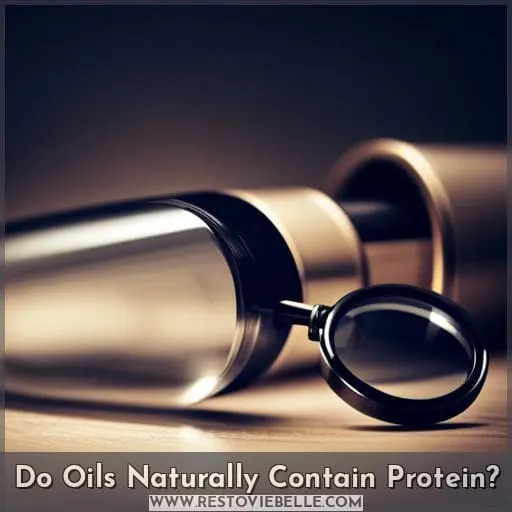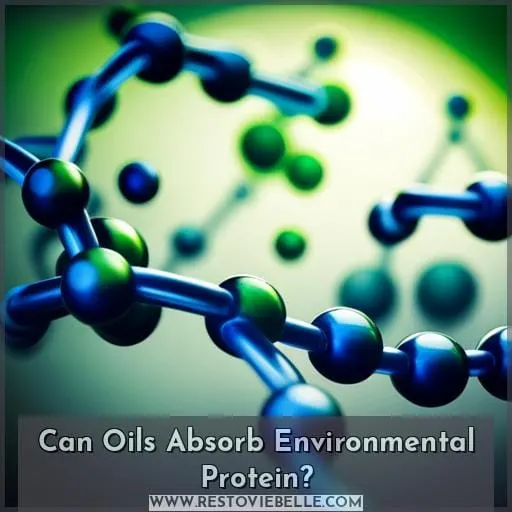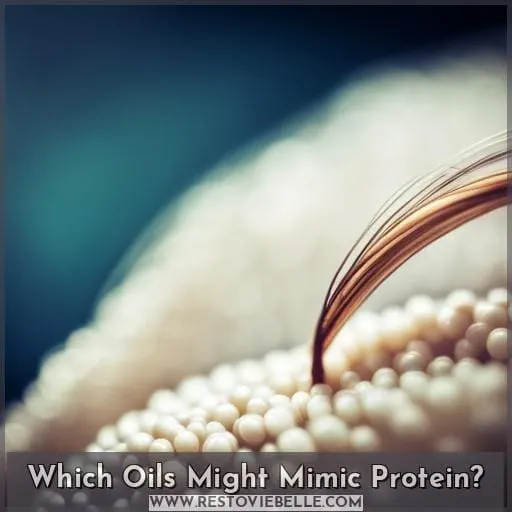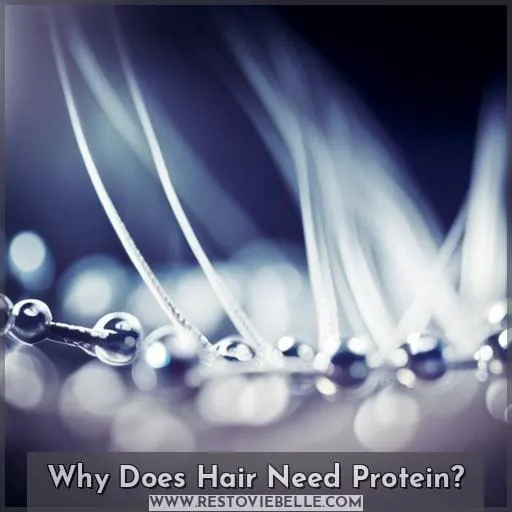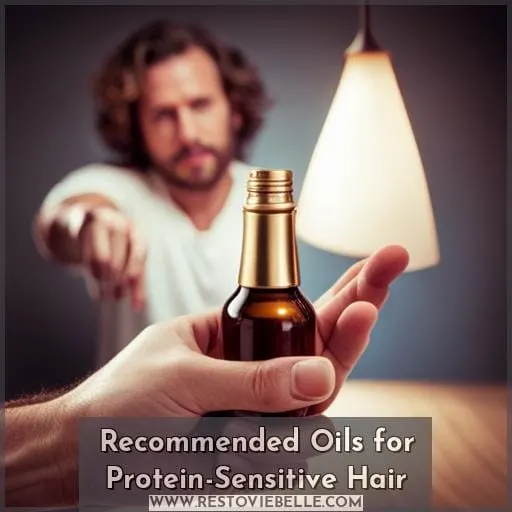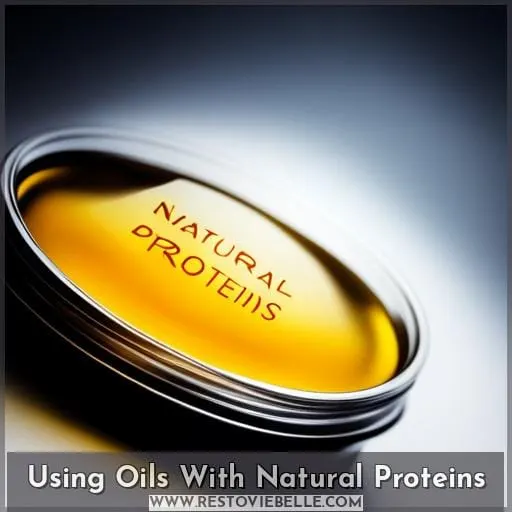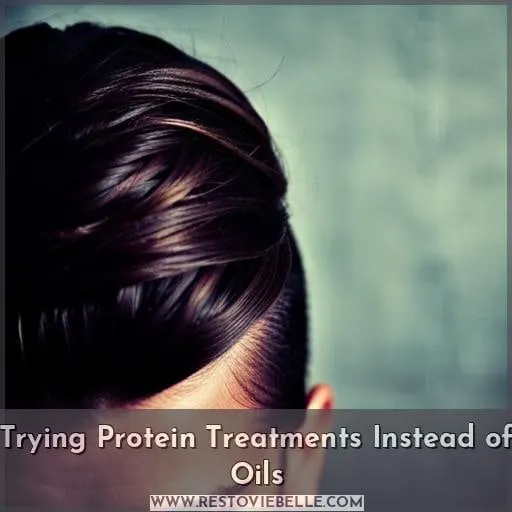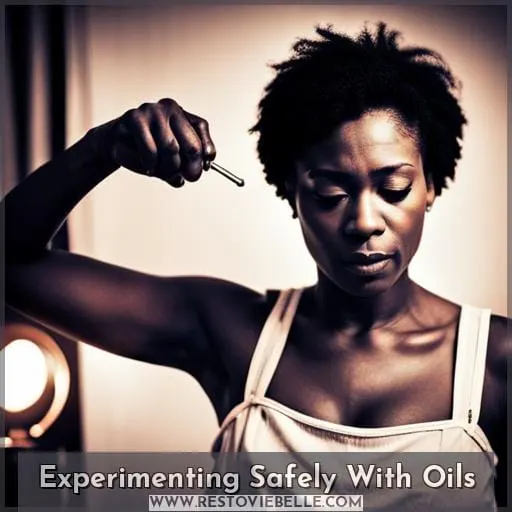This site is supported by our readers. We may earn a commission, at no cost to you, if you purchase through links.
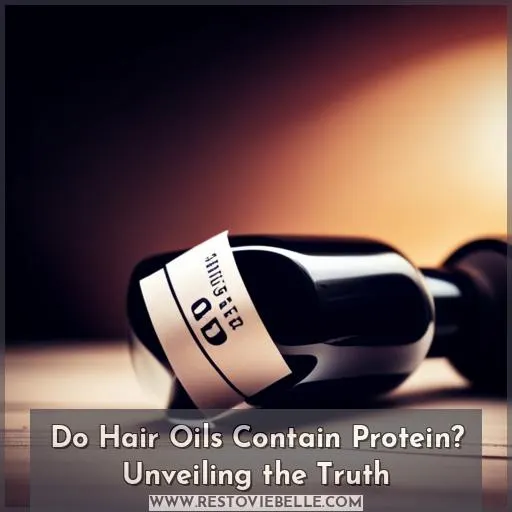 Imagine finally uncovering the truth about hair oils and protein.
Imagine finally uncovering the truth about hair oils and protein.
You’ve been searching for answers, wondering if these beloved oils actually contain the essential protein your hair needs.
Well, get ready to have all your questions answered as we delve into this intriguing topic.
From exploring whether oils naturally contain protein to discovering which ones might mimic its effects, we’ll leave no stone unturned in our quest for knowledge.
So sit back and prepare to unveil the truth about hair oils and their relationship with protein.
Table Of Contents
- Key Takeaways
- Do Oils Naturally Contain Protein?
- Can Oils Absorb Environmental Protein?
- Which Oils Might Mimic Protein?
- Why Does Hair Need Protein?
- Recommended Oils for Protein-Sensitive Hair
- Using Oils With Natural Proteins
- Trying Protein Treatments Instead of Oils
- Experimenting Safely With Oils
- Frequently Asked Questions (FAQs)
- Conclusion
Key Takeaways
- Oils don’t naturally contain protein.
- Some oils may mimic the effects of protein on hair.
- Plant-based sources such as soybean oil or corn oil may provide natural proteins.
- To truly benefit from protein treatments, consider using products that specifically contain hydrolyzed proteins.
Do Oils Naturally Contain Protein?
Oils, by nature, don’t naturally contain protein.
While some oils may mimic the effects of protein on hair, they don’t actually contain any proteins themselves.
This is an important distinction to understand when considering the role of oils in your hair care routine.
When it comes to choosing a suitable oil for your needs, it’s crucial to look beyond claims of protein-rich or proteins infused.
Oils like coconut and olive oil are often praised for their ability to strengthen and nourish hair but this is due to their lipid content rather than actual proteins present in them.
To truly benefit from protein treatments, consider using products that specifically contain hydrolyzed proteins as these have been broken down into smaller molecules that can penetrate the hair shaft more effectively.
Plant-based sources such as soybean oil or corn oil may also provide natural proteins but remember that these are different from hydrolyzed forms commonly found in specialized treatments.
In conclusion, while certain oils can contribute positively towards improving the strength and health of your locks,hair oils alone don’t inherently possess any significant amount of protein content.It’s essential always opt for products formulated with specific plant-based sourceshydrolyzed , free from contaminants.
Can Oils Absorb Environmental Protein?
When it comes to the absorption of environmental protein by hair oils, there are two main concerns:
- Manufacturing contamination
- Storage contamination
Manufacturing processes can introduce proteins into oils if proper hygiene practices aren’t followed. Additionally, improper storage conditions may lead to oil contamination with external protein sources.
It’s crucial for manufacturers and consumers alike to prioritize cleanliness and proper handling of hair oils in order to minimize the risk of potential protein absorption from the environment.
Manufacturing Contamination
You wonder whether oils can absorb protein during manufacturing to later deposit that protein onto hair.
Manufacturing contamination occurs when oils come into contact with environmental proteins, which may affect the overall composition of the oil.
Heat exposure during manufacturing could potentially denature proteins and alter their size, making them more or less likely to be absorbed by the hair.
It’s crucial to consider these factors when using oils for your hair care routine and choose products that are free from contaminated sources like mineral oil or sunflower oil.
Storage Contamination
Continuing with the discussion on contamination, let’s explore how oils can potentially absorb environmental proteins during storage.
When stored in containers that aren’t airtight or made from certain materials, hair oils may be susceptible to absorption of external proteins. Factors such as oil oxidation and contact with contaminants can contribute to this process.
It’s crucial to consider the quality and purity of oil storage containers, as well as monitor the shelf life and potential for absorption rates to avoid any negative effects on your hair health.
Which Oils Might Mimic Protein?
To further explore the topic of oils mimicking protein, let’s delve into a few specific oils that have been known to exhibit similar properties.
- Coconut oil, often hailed as a versatile hair care ingredient, has been found to mimic protein due to its unique composition and penetration abilities.
- Avocado oil is another noteworthy option with its rich protein content that can nourish and strengthen hair fibers.
- Jojoba oil, although not technically containing proteins itself, closely resembles the molecular structure of human sebum which aids in protecting and moisturizing the hair strands like proteins do.
- Olive oil also showcases some protein-mimicking qualities through its high oleic acid content that contributes to enhanced hair strength and vitality.
- Lastly, hemp oil possesses essential fatty acids that promote healthy scalp conditions resembling certain effects of proteins on the hair follicles.
Incorporating these oils into your routine may offer vital benefits for maintaining strong and nourished locks while mimicking some aspects typically associated with proteins in traditional treatments.
Why Does Hair Need Protein?
To understand why hair needs protein, it’s essential to recognize its role in strengthening and protecting the strands.
Protein serves as a building block for hair, contributing to its structure and integrity. It helps reduce breakage by fortifying the hair shaft and increasing elasticity.
Hair that lacks sufficient protein may become weak, brittle, and prone to damage.
Strengthens Hair
As we delve further into the topic of hair strengthening, it’s important to understand why hair needs protein in the first place.
Protein plays a crucial role in strengthening hair by preventing protein loss and reinforcing natural proteins within the strands. It also helps prevent protein buildup, promoting healthy growth and providing shine to your locks.
Incorporating oils like coconut oil for DIY protein treatments or indulging in a relaxing protein scalp massage can effectively strengthen your hair.
Protects Hair
Protein is essential for protecting your hair from damage and maintaining its overall health.
Hair oils play a crucial role in providing this protection by preventing hair from drying out, becoming brittle, and losing moisture.
Incorporating protein-rich ingredients into these oils enhances their ability to nourish and protect your precious locks, ensuring they remain vibrant and beautiful.
Reduces Breakage
How can protein in hair oils help reduce breakage?
Protein is essential for maintaining the strength and integrity of the hair strands.
Hair oils containing proteins, such as keratin or hydrolyzed proteins, can penetrate the hair shaft and reinforce its structure.
This helps to prevent protein loss, which is often a leading cause of breakage.
By strengthening the hair from within, these protein-rich oils reduce frizz and add shine for healthier-looking locks.
Incorporating essential oils with meat-based proteins into your haircare routine can provide added benefits and protection against damage.
How can protein in hair oils help reduce breakage?
Protein plays a crucial role in strengthening your precious tresses by protecting them from damage caused by everyday stressors like styling tools, heat exposure, chemical treatments or even environmental factors like pollution that weaken your strands over time.
Hair needs good-quality building blocks to grow strong; just like it’s important to have plenty of vitamins A-Z on our plate every day (or at least try), it’s equally necessary that we make sure our crowning glory gets enough nutrients too!
When you apply oil enriched with proteins onto your scalp or rub it through wet lengths before blow-drying—they’re doing more than just adding moisture back into parched ends: they’re fortifying each strand deep inside where strength comes from.
By preventing excessive shedding due to lackluster mane health thanks largely because there isn’t an adequate amount left after all those split-ends start forming again…ugh! These vital ingredients also serve another purpose – reducing frizzing up top while giving off some serious shine below surface level…all without weighing down delicate hairs themselves either—which means fewer flyaways whipping around when you turn towards sunlight streaming through windows during midday meetings at work (you know what I mean).
The bottom line here ladies & gents: if you want stronger locks without resorting only exclusively unto salon-grade potions then go ahead & try using natural oils containing protein-rich ingredients.
They’ll nourish your hair strands from root to tip, making them healthier and less prone to breakage in the long run.
Recommended Oils for Protein-Sensitive Hair
For protein-sensitive hair, it’s recommended to consider oils such as:
- Coconut oil
- Argan oil
- Avocado oil
Coconut oil has been praised for its ability to mimic proteins without containing actual protein content. Argan oil and avocado oils are known for their nourishing properties that can help strengthen and moisturize hair without causing protein overload.
Coconut Oil
When it comes to nourishing protein-sensitive hair, one oil that’s often recommended for its beneficial properties is coconut oil.
Coconut oil has gained popularity in the hair care community due to its ability to strengthen and protect the hair. It can penetrate deep into the strands, providing essential nutrients and moisture.
The unique fatty acids present in coconut oil help repair damage caused by protein loss, making it an excellent choice for those with protein-sensitive hair.
Argan Oil
If you have protein-sensitive hair, consider using Argan oil. This recommended option offers various benefits for your hair.
Argan oil is known for its nourishing properties and can help promote hair growth while reducing hair loss.
Additionally, it provides moisture to dry and damaged strands, leaving your hair feeling soft and smooth.
Incorporating Argan oil into your routine can be a great way to care for protein-sensitive locks without compromising on the natural health of your tresses.
Avocado Oil
If you have protein-sensitive hair, consider incorporating avocado oil into your hair care routine.
Avocado oil is a beneficial option for those looking to nourish and hydrate their strands without the risk of protein overload.
It provides numerous benefits such as promoting hair growth, preventing breakage, and moisturizing dry locks.
With its rich composition of vitamins, minerals, and fatty acids, avocado oil offers a natural solution for maintaining healthy and vibrant hair.
Using Oils With Natural Proteins
When it comes to using oils with natural proteins for your hair, two options that stand out are soybean oil and corn oil.
These oils contain protein-rich components that can provide nourishment and strengthen your strands.
Incorporating these oils into your hair care routine may help improve the overall health and vitality of your hair.
Soybean Oil
To maximize the benefits of oils for protein-sensitive hair, consider incorporating soybean oil into your hair care routine.
Soybean oil is a great alternative to coconut oil as it contains natural proteins that can promote hair growth and prevent hair loss.
Compared to coconut oil, soybean oil offers unique properties that can nourish and strengthen your locks without weighing them down or causing further protein sensitivities.
Corn Oil
When considering oils with natural proteins, corn oil is a viable option for nourishing and strengthening hair.
Corn oil is rich in essential fatty acids that can penetrate the hair shaft, providing deep hydration and promoting overall hair health. It helps to improve the elasticity of your strands, reducing breakage and improving manageability.
Additionally, corn oil contains antioxidants that can protect your scalp from oxidative damage.
However, it’s important to note that individual reactions may vary and some people may experience side effects such as scalp irritation or allergic reactions when using corn oil on their skin or hair.
Trying Protein Treatments Instead of Oils
If you find that hair oils don’t provide the desired protein benefits for your hair, consider trying protein treatments instead.
Salon keratin treatments and at-home protein treatments can help replenish and strengthen your strands from within.
These treatments contain hydrolyzed proteins that have been broken down into smaller molecules, allowing them to penetrate the hair shaft more effectively.
Salon Keratin Treatments
You can explore an alternative to using oils by trying salon keratin treatments for a protein boost in your hair.
Salon keratin treatments are a popular choice for those looking to repair and strengthen damaged hair.
These protein treatments work by infusing the hair with essential proteins, helping to restore its strength and resilience.
Whether you have high or low porosity hair, salon keratin treatments can be customized to suit your specific needs, giving you healthier and more manageable locks.
At-Home Protein Treatments
For those looking to explore alternative options beyond hair oils, trying at-home protein treatments can be a beneficial choice.
Protein treatments offer a way to nourish and strengthen your hair without relying solely on oils. These treatments contain amino acids that penetrate the hair shaft, improving its overall health and resilience.
They can help address issues such as low porosity, thinning density, and lack of elasticity in your strands.
Consider incorporating protein treatments into your routine for healthier-looking locks.
Experimenting Safely With Oils
To safely experiment with oils, it’s important to understand their potential effects on hair.
-
Patch Test:
- Before applying any new oil to your hair, always perform a patch test first.
- Apply a small amount of the oil on a small section of your scalp or behind your ear and wait for 24 hours to check for any adverse reactions.
-
Start Small:
- When using oils for the first time or trying out new ones, start with small amounts.
- Applying too much can lead to greasy and weighed-down hair.
-
Consider Hair Type:
- Different oils work better for different hair types and concerns.
- Research which oils are best suited for your specific needs before incorporating them into your routine.
Remember that experimentation should be done in moderation – don’t overwhelm your strands by constantly switching up products or overusing certain oils without giving them enough time to show results.
Frequently Asked Questions (FAQs)
Can oils naturally contain protein?
Hair oils, such as coconut oil and almond oil, don’t naturally contain protein.
However, they can still provide valuable nourishment and protection for your hair.
Incorporate protein-rich dietary choices and DIY treatments for optimal results in achieving strong and healthy hair.
Can oils absorb environmental protein?
Hair oils don’t naturally contain protein.
They can’t absorb environmental proteins either.
However, oils can provide nourishment and moisture to your hair, promoting its overall health and strength.
Which oils might mimic protein?
Certain oils, like coconut oil, can mimic protein due to their ability to penetrate the hair shaft and reinforce natural proteins. These oils contribute to strengthened hair and enhanced protection from cuticle to cortex.
Why does hair need protein?
To understand why hair needs protein, imagine it as a delicate tapestry.
Just as threads hold the fabric together, proteins strengthen and fortify each strand.
Without enough protein, your hair may become weak and prone to breakage.
Is it safe to experiment with oils for protein-sensitive hair?
Experimenting with oils for protein-sensitive hair is safe. While oils don’t inherently contain proteins, they offer other benefits like moisturization and strength reinforcement.
Consider trying macadamia, almond, or coconut oil to nourish your locks without triggering protein sensitivities.
Conclusion
In summary, the truth about hair oils and protein has been unveiled.
While oils don’t naturally contain protein, they can absorb environmental protein that may contaminate them during manufacturing or storage.
However, certain oils like coconut oil, argan oil, and avocado oil can mimic the effects of protein on hair.
For those with protein-sensitive hair, oils like soybean oil and corn oil can provide natural proteins.
Alternatively, protein treatments, whether done at a salon or at home, can be a safe and effective option.
So, experiment with oils and protein treatments to find what works best for your hair.
